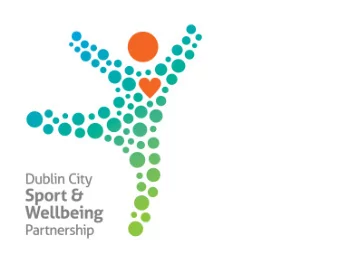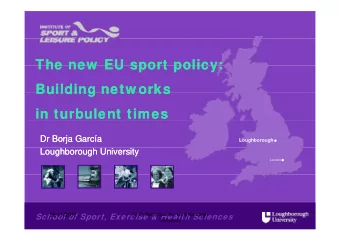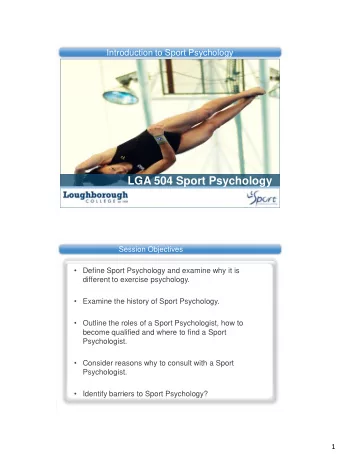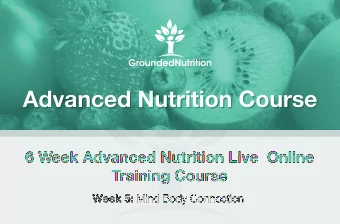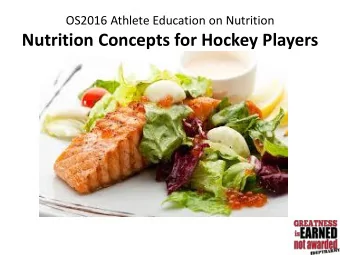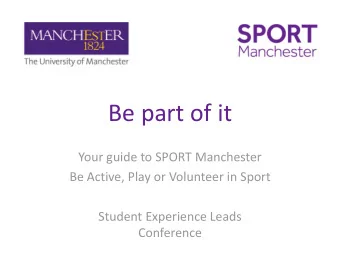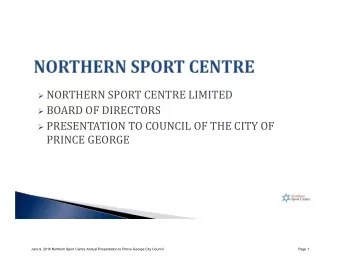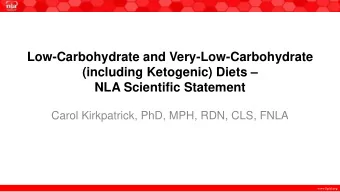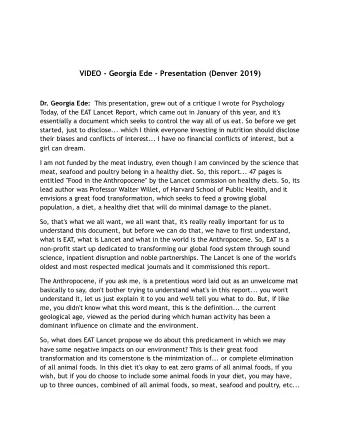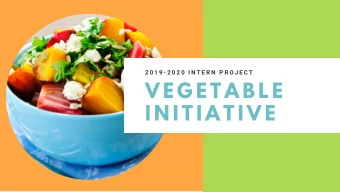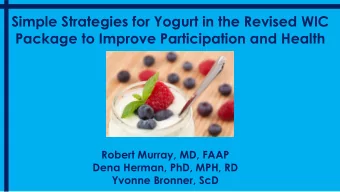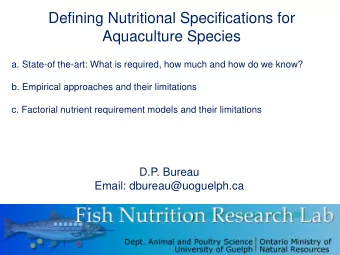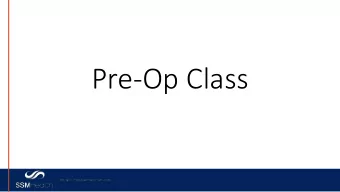
Sport Nutrition Abigail Swancott Registered Dietitian and Sports - PowerPoint PPT Presentation
Sport Nutrition Abigail Swancott Registered Dietitian and Sports Nutritionist Healthy Eating Carbohydrate Carbohydrate is the key part of your sports diet as it fuels your activity Your body stores energy as glycogen in the muscles and
Sport Nutrition Abigail Swancott Registered Dietitian and Sports Nutritionist
Healthy Eating
Carbohydrate • Carbohydrate is the key part of your sports diet as it fuels your activity • Your body stores energy as glycogen in the muscles and liver • Carbohydrates should provide about 60% of you dietary intake Low carbohydrate diet leads to poor refuelling which will ultimately affect o performance • Low carbohydrate – 60 minutes • Moderated carbohydrate – 1 hour 55 minutes • High carbohydrate – 2 hours 50 minutes
Carbohydrate • Complex carbohydrates should be the main part of your meals Bread o Rice o Cereals o Potatoes o Pasta o • Simple carbohydrates should be limited as they provide less nutritional value Biscuits o Cakes o Sweets o
Glycaemic Index (GI) • Not all carbohydrates are equal • Low GI foods release their energy more slowly Keep you feeling full o Provide a sustained source of energy o • High GI foods release their energy more quickly Provide a quick releasing source of energy o • However, can be difficult to interpret Some fruits have high GI, chocolate has low GI o GI depends on the food, how it’s cooked and what it is served with o
Glycaemic Index (GI) Low GI Medium GI High GI Bergen bread, Multigrain bread, White bread, raisin bread, crumpets, gluten free bread, granary bread wholemeal pita bagels Sweet potatoes, Baked potatoes Mashed potatoes new potatoes with skin Pasta, basmati Long grain rice, White rice rice, egg noodles cous cous Porridge, special Shredded wheat, Weetabix, rice K, Fruit and fibre shreddies crispies, frosties
Protein • Protein is an important factor in your diet Growth and repair of tissues o Metabolic processes o Formulation of new tissue o Provides a stimulus for muscle growth o • Protein requirements are increased in athletes Requirements can be met with a well planned diet o Protein supplements used to supplement intake in addition to diet o Aim 1.4 – 1.7g/kgbw/day o = 119g in a 70kg player - 1 chicken breast = 40g, pint s milk = 20g • Adequate carbohydrate is needed to preserve muscle mass If carbohydrates are not available protein will be used to fuel exercise o
Protein • Protein rich foods Meat o Fish o Poultry o Beans and pulses o Eggs o Dairy products o • Aim to include lean, good quality sources to avoid excessive fat intake • Monitor portion sizes – there is no benefit to excessive intake of protein
Fat • Fat can be used as an energy source but plays a minor role in sport nutrition • Fat is more energy dense than other nutrients , excess intake will cause weight gain • High fat foods Fried foods o Processed foods and takeaways o Fats, spreads, sauces o Meats o
Micronutrients • Iron Ensure adequate iron intake to prevent anaemia o Animal sources of iron (haem iron) is better absorbed than plant sources o (non haem iron) Avoid tannins with iron containing foods o Include vitamin C with iron containing foods o • Calcium Ensure adequate calcium intake for long term bone health o Aim 1000mg daily (3 servings of dairy) o Choose low fat versions to limit fat intake – protein and calcium content o are comparable
Nutritional Requirements • Adequate energy intake is important in training Fuel adaptations o Optimise performance in training and competition o Prevent fatigue, injury, loss of weight and muscle mass o Weight loss strategies must be sensible o • However, training is not a get out clause to eat anything! Adequate intake can be easily achieved with regular meals and snacks o Quality nutrition strategies are key to performance o Too little energy will affect energy but excess calories will be stored as fat o which will ultimately affect performance
Calculating Requirements • Basal Metabolic Rate (BMR) body weight (kg) x 8.7 + 829 • Activity level 1.4 – sedentary, mostly seated/standing 1.7 – moderately active, regular walking/movement 2.0 – very active • Energy Expenditure (EE) in exercise Exercise calories per week / 7 Requirement = BMR x Activity level + EE
Calculating Requirements • For example: 70kg player, works in an office o Trains for 90 minutes 5 days a week o • BMR = 70 x 8.7 + 829 = 1,438 kcal • BMR x 1.4 = 2,032 kcal • Energy Expenditure from exercise = 575kcal/day Energy Requirement (maintain) = 2,608kcal
Meeting Requirements B Porridge (50g oats) with skimmed milk, raisins, small glass fruit juice MM Banana L Tuna sandwich (2 slices granary, tin tuna), apple, yoghurt MA Oat based cereal bar PT Milkshake EM Spaghetti Bolognese (80g uncooked pasta, 100g lean mince, vegetables), tinned fruit S 2 crumpets with jam = 2251kcal, 121g protein, 413g CHO, 45g fat 1.7g protein/kg/day, 6g CHO/kg/day
Weight loss / Gain • In order to gain weight you need to consume more calories than you are using Maintain quality dietary intake to achieve your requirements o • Increase portion sizes • Include regular snack and supper • In order to lose weight you need to consume less calories than you are using (~500kcal / day) Use sensible diet strategies o • Avoid drastically cutting energy intake • Avoid fad diets / low or no carbohydrate diets • Ensure adequate intake for performance
Training and Matches Regardless of your nutritional goals focus around training • and matches should be the same Supply adequate energy to fuel a session o Maintain hydration o Supply adequate protein and carbohydrate for recovery o Before sessions focus on fuelling with carbohydrate and • protein After sessions focus on providing substrates for recovery • and refuelling Every player is different – don’t try new strategies at • match time
Pre Training/Matches - Early Focus on adequate hydration and fuel for the session • Nutrition strategy depends on time of session • Evening o Morning o Early afternoon o Most players can tolerate food before exercise….if you • struggle aim little but more often Large meal > 4 hours pre session o Smaller meal 1- 2 hours pre session o Snack 1 hour pre session o Avoid high fibre and high fat foods pre session •
Pre Training/Matches - Early • For early sessions your nutritional strategy starts the night before No alcohol o Good nights sleep o Supper containing carbohydrate and protein to minimise overnight loss o • Make sure to have a good breakfast otherwise you will start the session depleted (>1-2 hrs pre session) Porridge or cereal o Scrambled egg on toast o Yoghurt / banana / cereal bar o • Include a small, easily digested snack if needed Fruit juice / sport drink o banana o Jaffa cakes / jelly babies o
Pre Training/Matches - Late • Eat regularly throughout the day Make healthy choices o Prepare your food to make sure you have what you need available (eg if o you’re training after work etc) • Make sure you include a snack between lunch and your session Lean protein filled sandwich o Yoghurt and cereal bar o Rice cakes with peanut butter and a banana o Malt loaf / fruit loaf / tea cake o
During Training/Matches • During long or intense sessions you will need to maintain your energy supply • Ensure adequate hydration Drink regularly through the session o Salt promotes thirst and fluid retention o Electrolytes will help replace sweat losses o Weigh in and out of training to estimate losses o • Carbohydrate should be included in sessions lasting over 60 minutes Sports drinks (isotonic) o Carbohydrate gels o Jelly babies/jaffa cakes/banana/orange o
Post Training/Matches • Focus on recovery Provide carbohydrate to replenish glycogen stores o • 90 minute window during which glucose is absorbed most efficiently • Approximately 1 g / kg body weight (eg 70g) o Slice bread = 15-20g, pint milk = 60g, banana = 20-25g Provide protein to encourage anabolism and muscle repair o • Approximately 20g protein • Strategy depends on session time • Don’t be tempted to skip recovery • Use high glycaemic index foods as they will release their energy more quickly
Post Training/Matches • If you are close to home have a small snack and a meal when you get home Rice cakes with peanut butter o Yoghurt o Fruit o • Have a snack or a meal with you if you are away from home Sandwich (2 slices) with lean protein filling (tin tuna) and a banana (27g o protein, 55g CHO) Frijj / Yazoo milkshake (20g protein, 63g CHO) o Pasta salad (min 60g pasta) with chicken (min ½ breast) and vegetables o • For early sessions eat well for recovery and continue to ear regularly through the day • Replace fluid losses (weigh pre and post)
Away Matches • You may need to be more prepared when playing away • Consider what you will eat before, during and after the match • Consider timings and food availability Don’t rely on service stations or vending machines o • Pre-made sandwiches will be of lower nutritional value than those you would make at home • Higher fat content will slow digestion – a problem pre and post Remember to take fluids as well as suitable snacks o
Dehydration • Symptoms of dehydration o Increased heart rate o Nausea o Inability to sweat o Light headedness o Poor endurance o Decreased skill co-ordination o Decreased mental functioning o Chills o Fatigue
Fluid and Hydration
Recommend
More recommend
Explore More Topics
Stay informed with curated content and fresh updates.
